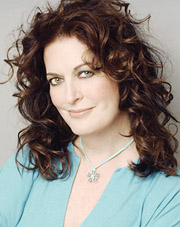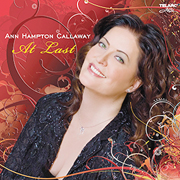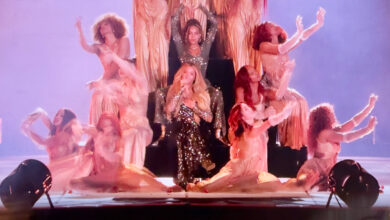‘Home’ at Last
An interview with the newly out Ann Hampton Callaway.
By Gregg Shapiro

On At Last (Telarc), Callaway just may get her wish “to help the world fall in love.” Fueled by “the power of music,” the “eclectic and very personal” selection of material on the album includes a reading of “Over the Rainbow” that reveals new tints in the oft-performed standard. There’s an interesting Joni Mitchell connection to be found on the disc as well. Callaway covers “Comes Love,” which Mitchell recorded on her Both Sides Now disc, and follows it with a genuinely original reading of Mitchell’s “Carey.” She also does a heartbreaking rendition of the Stevie Nicks/Fleetwood Mac gem “Landslide,” and both Callaway originals “Save a Place for Me” and “Finding Beauty” fit perfectly with the other material. The album is especially significant in that its release is timed with Callaway’s willingness to speak openly about being a member of the GLBT community. We spoke, fittingly enough, shortly before Valentine’s Day.
Gregg Shapiro: I’m one of those people who devours liner notes…
Ann Hampton Callaway: Oh, you’re a rarity. There are few of you left.
I know! And I love what you wrote in the CD booklet about how “good songs remind us that there is more to life than headlines.” Was that one of the motivators in collecting these songs for this disc?
I think it’s a way of me articulating the backdrop of the power of the adventure of love within a time that contains so much uncertainty. I think the importance of finding connection becomes even more urgent when you feel so uncertain about the world you’re living in and what’s going to happen the next moment. And having someone to share that adventure with becomes a heightened yearning and experience when you have this sense of impermanence inside your consciousness.
 When we look at our lives, we’re so information-obsessed. We have so many various forms of input coming at us from cell phones, e-mails, news, text messages. There’s so much data coming at us at all times, I think that the importance of songs now becomes even greater because we’ve become so in our heads that we… forget what it’s like to disappear into a gorgeous world, which music seems to be able to create better than almost anything I know. Especially during the last eight years of a truly mind-boggling time, and the whole heightened political season of “who’s going to be my next leader” and “what kind of country am I living in,” I think I have been particularly anxious about things.
When we look at our lives, we’re so information-obsessed. We have so many various forms of input coming at us from cell phones, e-mails, news, text messages. There’s so much data coming at us at all times, I think that the importance of songs now becomes even greater because we’ve become so in our heads that we… forget what it’s like to disappear into a gorgeous world, which music seems to be able to create better than almost anything I know. Especially during the last eight years of a truly mind-boggling time, and the whole heightened political season of “who’s going to be my next leader” and “what kind of country am I living in,” I think I have been particularly anxious about things.
So having found a partner and being able to celebrate finding this partner through my music has been a joyous occasion. I want to spread the joy and I want to kindle that hope in people—the beauty of music and what it can do, whether you’re single or with someone or entertaining the thought of being with someone. The older I get, the more awestruck I am by the power of music.
Did the events of the 2008 election, including the passage of Prop. 8 in California have any impact on your coming out, as it did with Wanda Sykes?
Yes! I was thinking about that today. You’re the first person I’m talking to about this openly. I’ve always been a combination of a magnanimous personality—I love people, I love my audiences, I’m so interested in the world. But I’m also a very private person. I’ve been partnered with people who have been very private, so it’s been an interesting climate throughout my life of those two different emotions and energies going on.
But I think the urgency of needing to elect a leader that was going to bring about the kind of change that was desperately needed—I started to get so much more outward with my friends and my community. For instance, being on Facebook and writing so openly about feelings. Trying to really connect with many people about these ideas and get more energy of a bigger and more powerful “us,” I think has been a part [of it]. I think turning 50 last May [2008] was another eye-opening, sobering [laughs]…
Okay, here I am being an advocate of people being their true selves and fulfilling their greatest potential, and I’m always trying to nurture that in other people, and I looked philosophically at my own life and I realized that for me to own up to that wish for myself I had to be willing to step forward into the light and speak more candidly about my life and what I’ve learned. Politically, I’m a very political person. Being raised by a journalist [John Callaway], he fostered the idea of always seeing both sides of the picture. I’m a very passionate person and I do feel that, in our lifetime, that it’s essential for us to fight for human rights.
There was a great, great victory to have Barack Obama elected as our president. But it was a huge disappointment to have Prop. 8. So I do feel that it’s time for me to do my part. That’s one of the reasons I’m stepping out.
I’m glad that you mentioned your father, because the coming-out process can be difficult at any age—did you get unconditional love and support from your family?
I have it now. Because I’m not a black-and-white story—I’ve been very attracted to men. I’ve had a lot of relationships with men and I’m still attracted to men. But I don’t fall in love with men. So because my parents understood that about me, I think they always entertained the thought that maybe the right man would come along. Eventually, I think they realized [laughs] that their daughter was who their daughter was. I’m very grateful that whatever difficulties they had with it, they got through it all. I have an extremely supportive and loving family. I’ve been out to my friends and so many of my professional cohorts for years.
But in terms of my audiences, I’ve always chosen to leave a certain amount to the imagination. If you’re listening to me singing a love song, I’ve advocated the idea that an audience can picture whoever they wanted as they heard the words that I was singing. That’s a sense of mystery that I think makes things powerful. But also, as you get older and people get to know better, it seems…not that I’m going to make it a headline in my life because there are so many things that I think are more important than my sexual identity, which is complicated, but I do think that being yourself is essential.
I’m grateful to the many friends over the years, and the many important encounters that I’ve had over the years. Harvey Fierstein has been a great mentor and a part of my life. [Sir] Ian McKellan took me aside at a BBC interview years ago in London and told me how profound his coming out was to his creative life. And that haunted me for years. I remember afterward taking a long walk by the Thames and thinking about how much I yearned for that complete freedom to be who I am. I was with a partner at the time who was forbidding me from coming out. That put a big restraint on my own instincts and I kept with that lifestyle for a while because of her. I am now looking forward to seeing Ian McKellan’s words come to life as I break out of whatever threads of webbing that I have hidden behind.
How much did the inclusion of “Over the Rainbow,” the unofficial gay national anthem, have to do with this disc being released at the time of your coming out?
I think it’s a subliminal message for me. I didn’t consciously think, “I want a gay anthem on my CD,” but in hindsight it’s perfectly poetic that it turns out to be that I needed to sing this song. I felt such a reluctance to sing a song that had been so identified with Judy Garland. Being friends with Liza Minnelli, I’ve always tip-toed around that song.
You’ve always included at least one of your own compositions on your discs. Is there a process that you go through of matching your own material to existing compositions or vice versa?
Yes, there is. Originally, this CD was going to be all originals. It evolved into a collection of very eclectic songs that included my own songs. The two songs, “Finding Beauty” and “Save a Place For Me,” seemed to be the best fit of the songs that I’d written for my sweetheart. It became like a movie. I started to craft a storyline of flashbacks and fast forwards, and the whole underpinning of the album is the final song “On My Way to You,” [a reflection of] the many interesting steps I’d taken towards finally finding true happiness.
It’s very intimidating to try to imagine that you’ve written a song that will be good company with a Harold Arlen song. I think so many of my fans and music lovers really appreciate what I have to say about my life. It takes a certain amount of surrendering to any thought about comparing yourself and just doing what you need to say. “Finding Beauty” is a great expression of my process of discovering my partner. The other song was actually a poem that emerged from the sense that I was never going to get to be with my partner. I was trying to find a way of accepting finding another way of loving her that would be truthful of my feelings and respectful of her feelings.
“Carey” by Joni Mitchell…
One of my inspirations…
…is one of the most thrilling arrangements and renditions I’ve ever heard.
I’m so glad to hear you say that. Because the review on iTunes said that it was a misfit and it didn’t belong on the album [laughs].
I disagree. I think it’s a fresh take on the song. Why did you choose this Joni song?
I love the adventure of taking songs that mean a lot to me…and it takes a long time sometimes. [“Blue”] was my first Joni Mitchell album and I memorized it and sang along with it. I devoured it when I was a teenager. I never dreamed of touching any of Joni Mitchell’s songs because, to me, she was the ultimate interpreter of her own music. But I changed my mind about the song and it was in the process of rehearsing with my band and I said I wanted to try the song. I came up with a rhythm, a feel, and I said to Jay Leonhart that I wanted him to be the mastermind behind it. His incredible imagination took over and we created this whole new “Carey.” I think it’s one of my favorite cuts on the album.
Speaking of Joni, she also did a cover of “Comes Love.” Why did you want to cover that one?
That album [Both Sides Now] is one of the most beautiful albums of standards that I’ve ever heard. It’s a brilliant album. I’m so glad that she’s singing that kind of music, too. I hadn’t ever considered singing “Comes Love” until my producer, Elaine Martone, said, “I really hear you singing this song.” I hadn’t tried it or heard it that much in my life. To me, it’s a sexy, fun song. And when Wycliffe Gordon [laughs]…I have to say that that was one of the most delightful and thrilling musical encounters I’ve ever had. His trombone solo on that recording is one of the feistiest, whimsical, sexy…it just makes me smile every time I hear it.
At the other end of the spectrum, I got choked up over your cover of “Landslide.”
Thank you! It’s a song that wasn’t on my radar until my partner said, “I want to hear you sing this song.” I was reluctant at first. I didn’t grow up listening to a lot of Fleetwood Mac. When I heard this song, the lyrics blew me away. The emotions in the song felt so powerful to me that I couldn’t wait to dive into it. I think it’s one of the sublime pop songs of our time.
You’ve mentioned your partner Kari a number of times and the album is dedicated to her. How long have you and Kari been together?
We’re going to celebrate our two-year anniversary in a few days.
That’s wonderful. With this coming out do you see this as a way of also reaching other audiences? To play an Olivia Cruise, for instance, or the Dinah Shore Weekend?
I’d love to! They’ve talked to me for years, and I don’t know why it’s never happened. I’ve played on RSVP cruises. I’ve sung with almost every gay chorus in the country. I’ve already been on the scene for quite a long time. I don’t know that people really know who I am to the degree that I’m willing to share right now. Who knows where that will take me and what adventures are ahead.
I think it’s a very interesting time in the gay community. It’s such a more beautiful climate to be who we are, thanks to the many heroic people, straight and gay and bi. There’s been so much growth in our lifetime and there’s still so much growth that we need to make. I do look forward to whatever ways I can help the community and connect with the community.
I’m a singer for all people, but I do have a very strong feeling about my gay following. I was recently at the opening performance for GALA [GLBT choruses] in Florida. Three thousand gay guys! It was the most incredible audience. There’s so much that we’ve all been through. People understand and listen to the lyrics. They appreciate my humor in such a deeper way. I remember when I was starring on Broadway in Swing. My co-star and I would listen to hear if the audience would laugh at certain things. We were guessing how many gay people were in the audience. Is this going to be a good audience or a stuffy audience? There was always the sense that if there was enough people laughing, then our people are out there.
Gregg Shapiro is a past recipient of the annual OutMusic award that recognizes contributions by non-musicians in furthering the work of GLBT performers.










